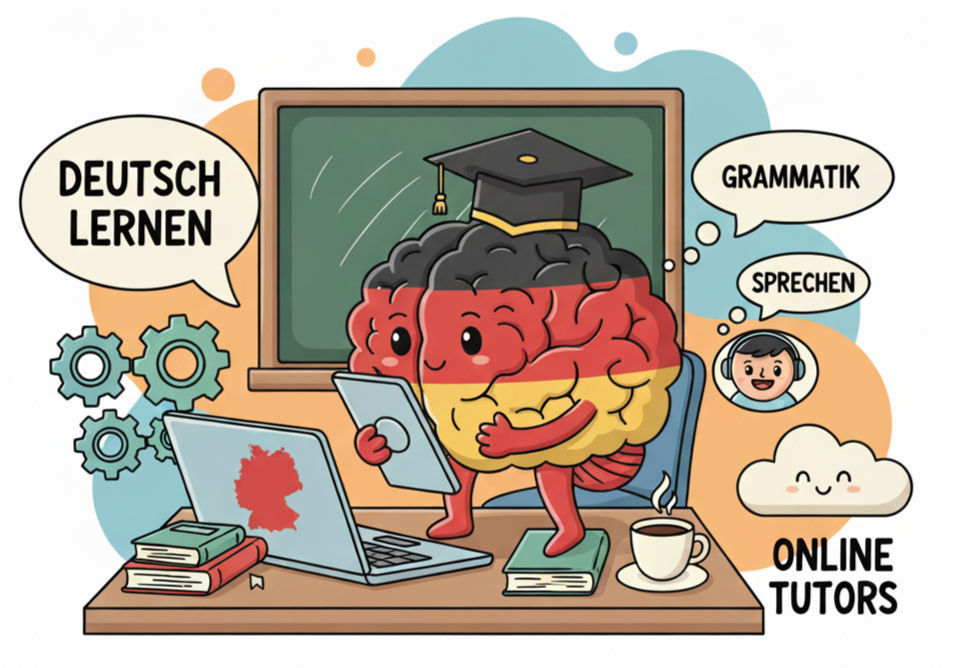#Part 2 - How to Learn Effectively with Online German Tutors
- Surenthar Manoharan
- Oct 22, 2025
- 4 min read

Learning a new language can be both exciting and challenging. German, with its rich history and cultural significance, is a popular choice for many language learners. Thanks to technology, mastering German is now more accessible than ever through virtual German tutoring. This method offers flexibility, personalized learning, and access to expert tutors from anywhere in the world. In this article, we will explore how virtual German tutoring can help you learn effectively and provide practical tips to maximize your progress.
Why Choose Virtual German Tutoring?
Virtual German tutoring offers several advantages over traditional classroom learning or self-study. One of the biggest benefits is flexibility. You can schedule lessons at times that suit your lifestyle, whether you are a student, professional, or busy parent. This flexibility allows you to maintain a consistent learning routine without sacrificing other commitments.
Another key advantage is personalization. Unlike group classes, virtual tutoring sessions are tailored to your individual needs, learning pace, and goals. Whether you want to focus on conversational skills, grammar, or exam preparation, your tutor can design lessons that target your specific areas for improvement.
Additionally, virtual tutoring connects you with native speakers and experienced teachers from around the globe. This exposure to authentic language use and cultural insights enhances your learning experience and helps you develop a natural accent and fluency.

How Virtual German Tutoring Enhances Language Skills
Virtual German tutoring is effective because it combines interactive technology with expert guidance. Here are some ways it enhances your language skills:
Speaking and Listening Practice: Real-time conversations with your tutor improve your pronunciation and listening comprehension. You get immediate feedback and can practice everyday dialogues.
Customized Learning Materials: Tutors often use multimedia resources such as videos, audio clips, and interactive exercises tailored to your interests and proficiency level.
Grammar and Vocabulary Mastery: Tutors explain complex grammar rules clearly and help you build a strong vocabulary through contextual examples.
Cultural Understanding: Learning about German culture, traditions, and idioms makes the language more meaningful and easier to remember.
To get the most out of your sessions, prepare questions in advance and review lesson notes regularly. Consistent practice outside of tutoring hours is also essential for retention.

Notebook with German vocabulary and grammar notes
Tips for Maximizing Your Virtual German Tutoring Experience
To ensure your virtual German tutoring is productive and enjoyable, consider these actionable recommendations:
Set Clear Goals: Define what you want to achieve, such as passing a language exam, improving conversational skills, or preparing for travel.
Create a Dedicated Study Space: Choose a quiet, comfortable area with a reliable internet connection to minimize distractions.
Use Technology Tools: Utilize language apps, flashcards, and online dictionaries alongside your tutoring sessions.
Engage Actively: Participate fully in lessons by asking questions, repeating phrases aloud, and practicing new vocabulary.
Schedule Regular Sessions: Consistency is key. Aim for at least two to three sessions per week to maintain momentum.
Record Sessions: If possible, record your lessons to review difficult concepts and track your progress.
By following these tips, you can accelerate your learning and build confidence in your German skills.
The Role of Technology in Virtual German Tutoring
Technology plays a crucial role in making virtual German tutoring effective and accessible. Video conferencing platforms like Zoom or Skype enable face-to-face interaction, which is vital for practicing speaking and listening. Many tutors also use digital whiteboards, screen sharing, and interactive quizzes to make lessons engaging.
Moreover, online platforms often provide access to a wide range of resources, including:
Language games and exercises
Pronunciation tools
Grammar checkers
Cultural videos and podcasts
These tools complement your tutoring sessions and allow you to practice independently at your own pace.

Finding the Right Virtual German Tutor for You
Choosing the right tutor is essential for a successful learning journey. Here are some factors to consider:
Qualifications and Experience: Look for tutors with formal language teaching credentials and experience in teaching German as a foreign language.
Teaching Style: Some tutors focus on conversational practice, while others emphasize grammar or exam preparation. Choose one that matches your learning preferences.
Native Speaker vs. Non-Native Speaker: Native speakers provide authentic language exposure, but experienced non-native tutors can also offer valuable insights.
Reviews and Testimonials: Check feedback from other students to gauge the tutor’s effectiveness and professionalism.
Trial Lessons: Many tutors offer trial sessions. Use this opportunity to assess compatibility and teaching methods.
Once you find a tutor who fits your needs, commit to regular sessions and communicate openly about your progress and challenges.
For those interested in exploring options, online german tutoring offers a platform to connect with qualified tutors who specialize in personalized virtual lessons.
Learning German through virtual tutoring is a rewarding experience that opens doors to new cultures, career opportunities, and personal growth. Remember that language learning is a gradual process that requires patience, practice, and persistence. Celebrate small victories, stay motivated, and immerse yourself in the language as much as possible.
By leveraging the benefits of virtual German tutoring, you can achieve fluency and confidence in your German skills from the comfort of your home. Start your journey today and discover the joy of mastering a new language with expert guidance and modern technology.







Comments